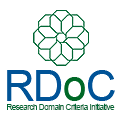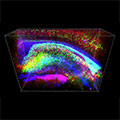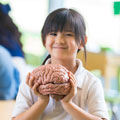Science News from 2013
- Transgenic Mice Lines Aid in Brain Circuit Imaging
-
Neuroscientists have generated over 250 genetically engineered mice lines that will help further our understanding of the human brain.
- NIMH Twitter Chat on Depression and Older Adults
-
Join NIMH’s Jovier Evans, Ph.D., Chief of the Geriatric Translational Neuroscience Program, for a Twitter Chat on depression and older adults.
- NIH Directors Discuss Sequestration and Research on C-SPAN
-
Despite facing lean financial times, NIH continues to generate the most bang for the buck regarding research. Tomorrow on C-SPAN Washington Journal, NIH Directors Drs. Collins, Insel, Fauci, Varmus, and Green will field questions from the public pertaining to sequestration and research as well as other topics.
- NeuroBioBank Gives Researchers One-stop Access to Post-mortem Brains
-
The NIH NeuroBioBank provides researchers with one-stop access to post-mortem brains.
- NIMH Twitter Chat on Bullying Prevention
-
NIH experts Drs. Chris Sarampote and Valerie Maholmes discuss bullying prevention.
- NIMH Scientists Honored with 2013 Brain & Behavior Research Foundation Awards
-
Miss the Twitter chat on the teen brain and Brain Awareness Week? Read the transcript.
- Streamlined Method Offers Shortcut to Generating Neurons for Discovery
-
Researchers have found a shortcut to rapidly convert induced human stem cells into healthy neurons for “disease-in-a-dish” discovery – and, ultimately, personalized medicine.
- Three NIH Scientists Elected into IOM
-
NIMH’s Daniel S. Pine, M.D., is one of three NIH scientists elected as members of the prestigious Institute of Medicine.
- Exposure / Ritual Prevention Therapy Boosts Antidepressant Treatment of OCD
-
A form of behavioral therapy augmented antidepressant treatment of obsessive compulsive disorder (OCD) better than an antipsychotic.
- NIMH Grantee Receives 2013 Nobel Prize
-
Thomas C. Südhof, M.D., along with James E. Rothman, Ph.D., and Randy W. Schekman, Ph.D., received the 2013 Nobel Prize in Physiology or Medicine for their discoveries delineating how a cell organizes its transport system.
- Former NIMH Grantee Receives 2013 MacArthur Fellow Award
-
Susan Murphy, Ph.D., a statistician from the University of Michigan and former NIMH grantee, is one of 24 recipients of the MacArthur “Genius” Award.
- Science/AAAS Google+ Hangout on the Adolescent Brain Featuring NIMH’s Jay Giedd, M.D.
-
NIMH scientist Jay Giedd, M.D. discusses the teen brain with Science/AAAS in a Google+ Hangout.
- Jay Giedd on PBS Documentary “Brains on Trial”
-
NIMH’s Jay Giedd discusses brain scan research with Alan Alda in the two-episode PBS documentary “Brains on Trial.”
- NIMH Grantees Receive 2013 Lasker Award
-
Two National Institute of Mental Health (NIMH) grantees recently collected the prestigious 2013 Albert Lasker Basic Medical Research Award for their meticulous mapping of the molecular mechanisms involved in neurotransmitter release, the process by which the brain send and receives chemical messengers.
- NIMH Twitter Chat on Suicide Prevention
-
To commemorate World Suicide Prevention Day on September 10, 2013, NIMH will host a twitter chat on the topic.
- Jane Pearson Talks About Suicide Prevention Research on NPR’s Science Friday
-
NIMH scientist Dr. Jane Pearson appeared on NPR’s Science Friday to discuss the latest findings in suicide prevention research.
- Webinar on Childhood-Onset Schizophrenia with NIMH’s Judith L. Rapoport, M.D.
-
Register for a webinar on September 9 featuring NIMH scientist Dr. Judith Rapoport, who will discuss brain development in childhood and adolescence and childhood-onset schizophrenia.
- The More Hemispheric Lateralization, the Better Thinking Performance
-
Scans of resting human brain activity reveal a secret to how it enhances our thinking prowess. It turns out that the left brain’s forte (e.g., language and fine motor skill) and the right brain’s (e.g., visual spatial attention) operate differently.
- Our New Search Engine Delivers Faster, Better Results
-
Our New Search Engine Delivers Faster, Better Results
- President Obama’s Executive Order Leads to National Research Action Plan
-
President Obama announced the National Research Action Plan (NRAP)—a comprehensive approach to improve our understanding and treatment of mental health problems affecting veterans, service members, and their families.
- New Data Reveal Extent of Genetic Overlap Between Major Mental Disorders
-
The largest genome-wide study of its kind has determined how much five major mental illnesses are traceable to the same common inherited genetic variations.
- Introduction to RDoC
-
Bruce Cuthbert, Ph.D., director, NIMH Division of Translational Research and Treatment Development, discusses the Research Domain Criteria (RDoC) initiative, which he coordinates.
- Webinar on Ketamine and Next Generation Therapies Featuring NIMH’s Carlos A. Zarate, M.D.
-
On August 13, 2013, Carlos A. Zarate, M.D., from the National Institute of Mental Health will give a live presentation titled “Ketamine & Next Generation Therapies,” where he will discuss his research on novel medications for treatment-resistant depression and bipolar disorder at the Brain and Behavior Research Foundation.
- Stray Prenatal Gene Network Suspected in Schizophrenia
-
Researchers have reverse-engineered the outlines of a disrupted prenatal gene network in schizophrenia, by tracing spontaneous mutations to where and when they likely cause damage in the brain.
- NAB Unveils Youth Mental Health Awareness Campaign
-
On Tuesday, July 23, the National Association of Broadcasters (NAB) launched “OK2Talk,” a mental health awareness campaign to increase understanding and awareness about mental health in youth. The campaign includes television and radio ads in English and Spanish that feature teens and young adults opening up about their experiences with mental health.
- Tom Insel Discusses The BRAIN Initiative on The Charlie Rose Brain Series
-
With nearly 100 billion neurons and 100 trillion connections, the human brain remains one of the greatest mysteries in science and one of the greatest challenges in medicine. NIMH Director Thomas Insel recently went on The Charlie Rose Brain Series to discuss The BRAIN Initiative, which aims to create better tools to solve this mystery.
- Community-based Treatments Offset Depression Disparities
-
Improving care for depression in low-income communities -- places where such help is frequently unavailable or hard to find -- provides greater benefits to those in need when community groups such as churches and even barber shops help lead the planning process, according to a new study.
- NIMH Twitter Chat on Post-traumatic Stress Disorder
-
Learn about post-traumatic stress disorder by joining NIMH’s Farris Tuma for a Twitter chat.
- Skewed Norms Weaken Case for Early Brain Overgrowth in Autism
-
Biases in standardized norms used to compare data on head size weakens evidence for early excess brain growth in autism, say NIMH intramural researchers.
- NIH Funds Industry Collaborations to Identify New Uses for Existing Compounds
-
NIH Funds Industry Collaborations to Identify New Uses for Existing Compounds
- Scan Predicts Whether Therapy or Meds Will Best Lift Depression
-
Pre-treatment scans of brain activity predicted whether depressed patients would best achieve remission with an antidepressant medication or psychotherapy, in a study that may help mental health treatment decision-making move beyond trial-and-error. The study sought to identify a biomarker that could predict which type of treatment a patient would benefit from based on the state of his or her brain.
- Bullying Exerts Psychiatric Effects Into Adulthood
-
Once considered a childhood rite of passage, bullying lingers well into adulthood. Bullies and victims alike are at risk for psychiatric problems such as anxiety, depression, substance abuse, and suicide when they become adults, reported a study partially funded by the National Institute of Mental Health (NIMH) that was published in the April issue of JAMA Psychiatry.
- DoD, VA, and HHS Report on Improving Mental Health Services for Military, Veterans, and Families
-
A new report from the Departments of Defense, Veterans Affairs, and Health and Human Services outlines progress made toward improving mental health services for members of the military, veterans, and their families.
- Twitter Chat on Borderline Personality Disorder
-
NIMH teams up with Perry D. Hoffman from the National Education Alliance for Borderline Personality Disorder for a chat about this topic.
- Ketamine Cousin Rapidly Lifts Depression Without Side Effects
-
NMDA or glutamate receptor modulators as antidepressants have come of age. Human clinical studies demonstrated that ketamine can ward off depressive symptoms within 2 hours of administration and last for several days. Yet serious side effects are attached to this drug, including excessive sleepiness, hallucinations, and substance abuse behavior.
- Taming Suspect Gene Reverses Schizophrenia-like Abnormalities in Mice
-
Scientists have reversed behavioral and brain abnormalities in adult mice that resemble some features of schizophrenia, by restoring normal expression to the gene Neuregulin1, which makes a protein important for brain development.
- DSM-5 and RDoC: Shared Interests
-
NIMH and APA have a shared interest in ensuring that patients and health providers have the best available tools and information today to identify and treat mental health issues, while we continue to invest in improving and advancing mental disorder diagnostics for the future.
- Flu in Pregnancy May Quadruple Child’s Risk for Bipolar Disorder
-
Pregnant mothers’ exposure to the flu has been linked to a nearly 4-fold increased risk for bipolar disorder in their adult child.
- Twitter Chat on PANDAS/PANS
-
NIMH experts discuss childhood rapid-onset OCD during our next Twitter chat on May 8, 2013.
- NIMH Twitter Chat on Attention Deficit Hyperactivity Disorder
-
Looking for more information and the latest findings on attention deficit hyperactivity disorder? Join NIMH’s Ben Vitiello on Twitter for a chat about this topic.
- Suppressing Protein May Stem Alzheimer’s Disease Process
-
Scientists funded by the National Institutes of Health have discovered a potential strategy for developing treatments to stem the disease process in Alzheimer’s disease, by blocking activity of a little-known regulator protein called CD33.
- Fat-free See-through Brain Bares All
-
Scientists can now study the brain’s finer workings, while preserving its 3-D structure and integrity of its circuitry using a breakthrough method, called CLARITY, that substitutes a clear gel for fat that normally holds the brain’s working components in place, making its normally opaque and impenetrable tissue see-through and permeable.
- New NIH Funding for Two Autism Centers of Excellence
-
The National Institutes of Health announced new funding for two Autism Centers of Excellence (ACE), bringing to eleven the number of ACE centers now being funded for up to five years.
- Autism Risk Unrelated to Total Vaccine Exposure in Early Childhood
-
A child’s risk for developing an autism spectrum disorder (ASD) is not increased by receiving “too many vaccines too soon,” according to a new study published in The Journal of Pediatrics.
- NIH Study Shows People with Serious Mental Illnesses Can Lose Weight
-
Losing weight is challenging for everyone. It can be particularly difficult for someone with a serious mental illness. An NIMH-funded clinical study proves that a modified diet and exercise program can work for people with serious mental illnesses. Participants lost 7 pounds more than controls—and continued to lose weight.
- Prevalence of Parent-reported Autism
-
The U.S. Centers for Disease Control and Prevention (CDC) and Health Resources and Services Administration released a report titled Changes in Prevalence of Parent-reported Autism Spectrum Disorder in School-aged U.S. Children: 2007 to 2011–2012.
- Twitter Chat on The Teen Brain—NIMH Experts Discuss Brain Awareness Week
-
Miss the Twitter chat on the teen brain and Brain Awareness Week? Read the transcript.
- Developing Male Brain Exposed to Less Stress-Protective Protein
-
Why are rates of schizophrenia and autism higher in males? New evidence implicates an enzyme expressed in the placenta that helps protect the developing fetal brain from adverse effects of maternal stress early in pregnancy.
- Students Explore the Wonders of the Brain
-
As part of the National Museum of Health and Medicine museum’s 14th annual Brain Awareness Week celebration, several hundred curious students from the Washington, D.C., area will have a chance to learn about what goes on inside the human brain, through a series of interactive exhibits led by scientists from eight institutes of the National Institutes of Health.
- NIH-funded Study Finds Community-based Efforts Increase HIV Testing, Prompt Behavior Change
-
An international study supported by NIMH reported today that community efforts, in comparison to standard clinical testing and counseling, yielded greater testing and lower HIV incidence in high-risk individuals.
- Five Major Mental Disorders Share Genetic Roots
-
Five major mental disorders share some of the same genetic risk factors, the largest genome-wide study of its kind has found.
- Mapping Brain Circuits Provides Clues to Schizophrenia, Earlier Detection of Psychosis
-
A newly identified brain circuit could lead to earlier detection of psychosis in patients with schizophrenia.
- Differences in On/Off Switches Help Explain How the Human Brain Evolved
-
A recent NIMH-funded study identified small regions of the genome that are uniquely regulated in human neurons, but not in primate neurons. The findings provide insight into human intellectual function and risk for human diseases, including autism and Alzheimer’s disease.
- Science/AAAS Webinar on Translational Neuroscience Research Featuring NIMH’s Carlos A. Zarate, M.D.
-
Want to know how the latest findings in neuroscience research go from bench to bedside? NIMH and Science/AAAS partnered to produce an informative webinar on translating neurobiological research into treatments.
- Threat Bias Interacts with Combat, Gene to Boost PTSD Risk
-
Excess attention to avoidance of threat – depending on the situation – can increase risk for PTSD, suggests a new study.
- NIMH Director Thomas R. Insel Received AMA’s Top Government Service Award
-
The American Medical Association feted Thomas Insel M.D., director of the National Institute of Mental Health, with its top government service award.
- Long-term Course of ADHD Diagnosed in Preschool Years Can be Chronic and Severe
-
Long-term Course of ADHD Diagnosed in Preschool Years Can be Chronic and Severe
- Precursor Symptoms to Autism Detected in 6-Month-Old Infants
-
Some autism symptoms can be seen in 6-month-old infants, possibly leading to even earlier intervention for this disorder.
- HHS Secretary Kathleen Sebelius on the State of Mental Health Care in the United States
-
HHS Secretary Kathleen Sebelius discusses state of U.S. mental health care, commemorates JFK’s speech on the topic 50 years ago.
- Imaging Biomarker Predicts Response to Rapid Antidepressant
-
A boost of activity in visual cortex at the back of the brain, triggered by the processing of emotional information, predicted depressed patients’ responses to a rapid-acting antidepressant.
- Brain Imaging Predicts Psychotherapy Success in Patients with Social Anxiety Disorder
-
Brain imaging might soon predict which treatment options would work best for patients with social phobia.
- 50 years ago, President John F. Kennedy Sent a Special Message to Congress About the State of Mental Health
-
Fifty years ago, President John F. Kennedy addressed Congress about the state of mental health—and changed the way Americans view mental health care.
- Leading Neurobiologist Appointed NIMH Scientific Director
-
Renowned neurobiologist Susan Amara recently joined NIMH as scientific director of its intramural research program.
- Study Documents that Some Children Lose Autism Diagnosis
-
An NIH-supported study has confirmed that some children who are accurately diagnosed in early childhood with autism lose the symptoms and the diagnosis as they grow older.
- Emergency Department Suicide Screening Tool Accurately Predicts At Risk Youth
-
Time-crunched ER nurses and doctors can use four questions to screen youth at risk for attempting suicide.
- Different Genes, Same Risk Pathway in Schizophrenia
-
Work by NIMH-supported scientists illustrates the variability of the genes and biology underlying illnesses like schizophrenia.


























































